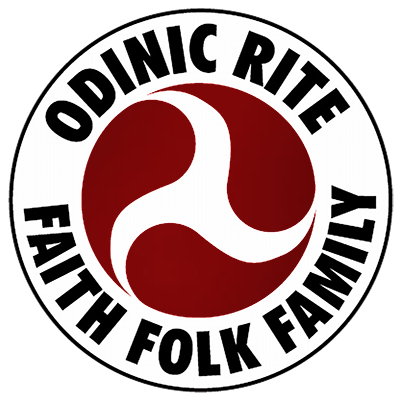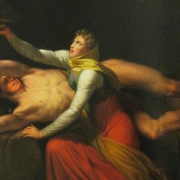Let Us Be True to Ourselves
ODINISM is one of the few religions that has not altered its beliefs to fit in with current fashion. The universalist religions, on the other hand, tend to change their spiritual principles in order to accommodate people of widely differing background and culture and in many ways the modern Christian church appears to be more of a political institution, with its ethical values being more political than spiritual in nature. By this it seems to be deserting the very people it once declared to cherish
In the Middle Ages the Christian religion was folk-orientated and the peoples of Europe identified their faith with what they knew as Christendom: their occidental ‘homeland and culture were one and the same. Orthodox Christianity today is a symbol of the erosion of that culture in its pandering to the largest numbers of diverse peoples in attempts to build a global faith.
The Odinist believes in starting from simple values: a shared sense of pride in being of common descent and of being possessed of one’s particular land, where there is no conflict of culture, language or religion. For modern Christians there is a vast gap between the culture of Europe and the faith they profess; they seem to cancel each other out and thus to contradict each other.
For Odinists, culture is religion; the preservation of folk values and heritage as expressed in language, in art, in custom and in tradition. We recognise that if we fail to survive as a people then our ‘spiritual interests will not survive either. Our ethic is our people and our gods are our companions. They are not our masters that we have sane ~ sort of slave relationship with. They brought us to these lands, they set the law and created the Odinist religion and thereby our way of thinking. For us to believe in any religion other than the religion of our ancestors would in effect cut ourselves off from our origins and we would be without parentage.
We Odinists regard ourselves as being just like all the other things in nature, as being a creation of the gods, born from them. So the gods can be seen both in nature and in human society. They are not an abstraction or a set of ethics imposed from above but something vital, something that comes from within. Odin, Balder, Frey and Thor are the symbols of our spiritual inheritance and if we are true to them we will always be fit in mind and body, satisfied with what the Earth can give. Without our Odinist religion we would be doomed to wither as a people, with no sense of purpose, and we would eventually be absorbed by’ the interests of peddlers of foreign cults. We must be true to ourselves. For that is the essence of Odinism: to rule oneself, to be independent, to face the gods squarely and not bow down be f ore same abstract, unknowable deity who comes from some foreign land.
The problem that faces us today is that young people leave school having been denied the opportunity of studying the ways of our people. Their ancient beliefs are trivialised whenever they are discussed by the media; Viking exploits are reduced to a joke image of lager-swilling plunderers. Could this be the result of insecurity and lack of self-worth that exists in so many Europeans today? Or, perhaps, feelings of guilt about their own background and heritage? As the world diversifies and former imperial territories gain their independence they tend to revert to ancient ways and customs. So we too must recognise that we have been robbed of our native ways and customs.
The spiritual health and welfare of our nation, as indeed of any nation, depends upon its people being true to themselves. For Odinists this is perhaps the most important part of our understanding: that Odinism begins there.


